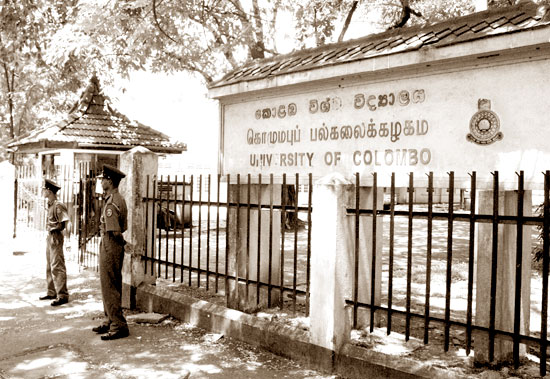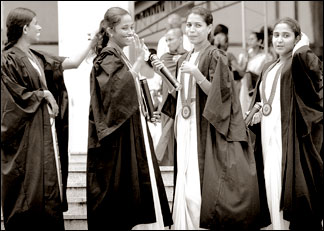Crisis in university education system - a systemic ailment?
Reform will not come from the educationists:
by Indeewara Thilakarathne
[email protected]
 The crisis in the Sri Lankan system of universities once again comes
to the forefront of the social discourse with the intensifying fracas
among rival students groups. Though the periodic fighting among
students' groups is a tell-tale symptom of the ailment, it does,
perhaps, not reflect the severity and the intensity of the syndrome that
blighted the entire body of education in the post - independent Sri
Lanka. The crisis in the Sri Lankan system of universities once again comes
to the forefront of the social discourse with the intensifying fracas
among rival students groups. Though the periodic fighting among
students' groups is a tell-tale symptom of the ailment, it does,
perhaps, not reflect the severity and the intensity of the syndrome that
blighted the entire body of education in the post - independent Sri
Lanka.
In a close examination of the entire system of education in Sri
Lanka, it is apparent that the current system in function has been
oblivious to the ground realities and insensitive to the fundamental
socio-economic changes brought about by the liberalisation of the
economy in 1977 and the subsequent emergence of private sector as the
engine of economic growth.
In the pre-1977 era, almost all the major sectors of the economy was
monopolised by the Government, thus becoming the principle provider of
employment for university graduates.
For the undergraduates who were passing out from the few national
universities in Sri Lanka, mainly University of Peradeniya (known then
as the University of Ceylon) and the University of Colombo, there was no
uncertainty with regard to their future employment prospects as the
Government sector was ready to recruit them.
Though there were private sector establishments in operation, their
contribution to the overall economy was minimal. Vital sectors of the
economy such as Education, Transport, and Plantation and even, to a
greater extent, retail and wholesale businesses were controlled by the
Government.
However, a significant socio-economic transformation took place in
1977 with the dismantling of the then command economy and the
introduction of the free market economy.
Since the government was withdrawn from most of the economic
activities, in its stead came the private sector with stiff competition
among diverse actors to secure a market segment in almost all vital
sectors of the economy.
Despite the sea change in the economic and social spheres, the Sri
Lankan system of education continues as it was thirty years ago, in
teaching students in Sinhala and Tamil, thus forming mono-lingual
constituencies and making them unemployable in the expanding private
sector.
 As the language of commerce and governance becomes English against
the backdrop of increasing direct foreign investment and transnational
conglomerates come into the local market in a big way, wealthy parents
wanted their children to have an English education. As the language of commerce and governance becomes English against
the backdrop of increasing direct foreign investment and transnational
conglomerates come into the local market in a big way, wealthy parents
wanted their children to have an English education.
This demand led to the birth of International Schools outside the
conventional system of education, producing a new breed of students with
language skills not only in English but also in other languages such as
French and German.
The by product of this process is the expansion of private schools.
In addition, plethora of foreign university affiliated colleges and
degree awarding institutions emerged to cater to the generation of
students who completed their primary education at International and
private schools.
However, the conventional system of education remains unchanged with
imparting no language skills, especially in English. Naturally, the
graduates produced by the conventional system of universities remain
unemployed as they cannot compete with the new breed of graduates from
foreign universities. Reforms in the education sector is sine qua non.
In this back drop, major reforms in the Education sector, commencing
from primary education is a pre-requisite in order to reform the
university education. The responsibility of imparting sound education
with necessary language skills for students and preparing them for
universities squarely lies in the schools.
However, over the years the school education sector has miserably
failed to impart language skills and other aptitudes for the students,
thus compelling the university lecturers to conduct lectures in Sinhala
and English media.
In an ideal scenario, schools should produce generation of students
who can follow lectures, write their assignments and make presentations
in English in order to introduce English in universities as medium of
instruction.
However, the stark reality is that the majority of undergraduates
'knowledge of English is so poor that they cannot follow lectures in
English, compelling university lecturers to continue lectures in Sinhala
or Tamil.
The inevitable result is that the conventional system of universities
continues to produce a large number of graduates of the same quality as
they produced thirty or forty years ago.
However, unlike in the past, the government cannot recruit the entire
educate segment produced by the university system as it does not
generate as many employment opportunities as it did before 1977.
The task has become more harder with the expansion of universities
after 1977 and the subsequent increase of the output of graduates. So
the government confronts twin problem of creating employment
opportunities for a large number of the graduate' population against the
backdrop of the declining involvement in the economy.
On the other hand, the private sector does not recruit undergraduates
from local universities, though it is expanding rapidly.
Although certain categories of graduates such as those who follow
courses in Engineering, IT and the Sciences find employment in private
sector, a vast majority of graduates follow the Liberal Art subjects
remain unemployed.
In order to exert pressure on the system of universities to reform
it, some market elements such as part of the expenses should be met by
the income generated by the university and can be introduced into the
system.
If the universities have to compete in attracting students, it will
add competitive dimension to the system, in turn compelling the
universities to attract sound academic staff and to provide a better
service to the students.
In order to attract more and higher calibre academics, the
universities will have to offer attractive remuneration packages with
additional incentives. However, this may lead to problems for some of
the universities as some universities would attract more students than
other universities.
In such a scenario, some universities would not attract students.
Though Sri Lanka does not have to commercialise the system of
universities, some competitive elements can be introduced in order to
bring about reform in the universities. It should be borne in mind that
reform in the education system is the key to force reform on the system
of universities.
However, it is a pity that political, official, military elites are
least concerned about improving primary education, especially in the
rural sector for the simple reason that their children either attend
some of the best public schools or private school. One of the factors
that has caused a crisis in the universities is that as academics are
under pressure to earn more money they pay little attention to their
work in the university which has a negative effect on the students'
moral.
The violent atmosphere in the universities might have been resultant
of the widespread idea of rather dim employment prospects, especially on
the part of students who do not follow professional courses.
Recognising the crisis in the university system may be the first step
towards addressing critical issues faced by the Sri Lankan system of
universities confronts. However, issues should have to be addressed
taking the socio-economic changes into consideration.
Unless the parents who send their children to rural schools which are
adversely affected by the crisis in the education system demand a
change, reform will not come from the educationists who, in fact, are
reaping the benefits from the crisis.
It could be alleged that these experts who regularly are in the
international conference circles and presenting academic papers on
reforms in the Educational Sector are not interested in reforms being
implemented in the rural sector or allocating resources to needy schools
in villages, simply because their children attend leading public schools
or international schools.
Therefore, it is high time that the allocation of funds for
resource-rich schools to be either reduced to the minimum or completely
stopped, directing benefits to resource-deprived schools in the rural
and plantation sectors. |
